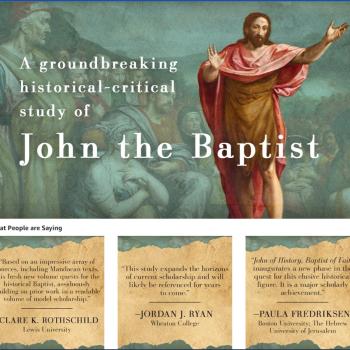Today I will be appearing on a conference panel about the book I helped produce, The Mandaean Book of John: Critical Edition, Translation, and Commentary.
I have several projects that I am juggling at the moment, but one that I am in the extremely early phases of is also one that I am incredibly excited about. Only time will tell whether its significance for a number of areas of religious studies will be as significant as I have begun to suspect. It involves bringing the Mandaean sources, used critically, into the picture in searching for the historical figure of John the Baptist. In this post, I’ll share a few teasers about directions that research is moving, as well as gather interesting things related to baptism, the Baptist, and the Mandaeans that have come to my attention recently.
These Iraqi Gnostics Hold Water Sacred. Jordanian Authorities Won’t Let Them Near a River.
Crossing Jordan and new Exodus: I’ve long wondered how old the tradition is that the baptism of Jesus took place at the same location that the Israelites crossed into the promised land. If John’s activity was focused there, that would have interesting possible ramifications for the significance of his baptism and what it was thought to symbolize.
https://www.tabletmag.com/jewish-life-and-religion/278332/crossing-the-jordan
Ezekiel’s temple and the Mandaean bitmanda: one question I am pondering is the influence of Ezekiel’s temple vision on John (and the Mandaeans and Jesus by way of him). I’m struck by the way the Mandaean cult hut seems to resemble what Ezekiel depicts – a structure in which sacrifice occurs and thus out from which saving water flows. Mandaeans do not do practice sacrifice, but priests do carry out ritual sacrifice within the bitmanda, and then water that has been caused to flow into it flows back out of it and is involved in the practice of baptism. Although like most Gnostics they don’t embrace the Jewish scriptures, could Ezekiel’s vision have been an influence on this practice (and on John’s and Jesus’) nonetheless?
Elsewhere other things appeared related to this topic, including:
Ian Paul blogged about whether John the Baptist was right
There was an article in Bible and Interpretation about baptism as a politically subversive act
The Daily Beast had an article about John as “the misunderstood man behind Lent”!
Mysterious 1st Century Graffiti: Vestiges of A Magical Mystery Tour Most Have Forgotten
I was also grateful that Richard Beck raised the question of what John might have meant – whether considered historically, literarily, or theologically – by calling Jesus “the lamb of God that takes away the sins of the world.” As I discussed in another post, it was a goat that should have done that, wasn’t it? Beck also blogged about the “bells and whistles of baptism.” See also:
https://ehrmanblog.org/guest-post-joel-marcus-on-his-new-book-on-the-john-the-baptist/
Here is a fascinating hymn focused on John the Baptist as well as Jesus.
I also think the interesting question needs to be asked of whether the information in the Gospel of John and in the Synoptics should be combined, leading to a reinterpretation of the latter. In particular, if we read the call of the disciples in Galilee as Jesus approaching people he knew previously from contact with them as part of John’s movement, then it ceases to sound like a very strange miraculous situation in which people are led to follow a stranger. Try reading those accounts again with the assumption in mind that these were people who recognized Jesus from time when both they and he were part of John’s entourage, which dispersed after his arrest. See as well: Andrew Perriman on the restoration of all things, and a sermon on Luke 5. Also:
A recent book about Greek myth and the Bible reviewed in Bryn Mawr Classical Review includes the information about the death of John in the New Testament – John’s death being an interesting point of divergence between Mandaean sources on the one hand and the New Testament and Josephus on the other.
Mark Lidzbarski’s publications in digital form
https://progressivechristianity.org/resources/the-human-race-seems-to-need-rituals/
http://www.christianorigins.div.ed.ac.uk/2018/10/05/early-christian-ritual-life/
John the Baptist’s warning to greedy governments. Also related to baptism and thus included here:
Baptism and kenosis (in Spanish)
https://www.episcopalcafe.com/swimming-in-the-current/
Bob Cornwall has had a whole series of blog posts about water and rivers in the Bible and beyond, which is ongoing.
Zechariah and literacy in the story of the naming of John (the Mandaeans also have a version of that story)
Combating religious persecution in Baghdad which impacts the Mandaeans as well as others.
Einojuhani Rautavaara’s Vigilia (for a service focused on John the Baptist):













